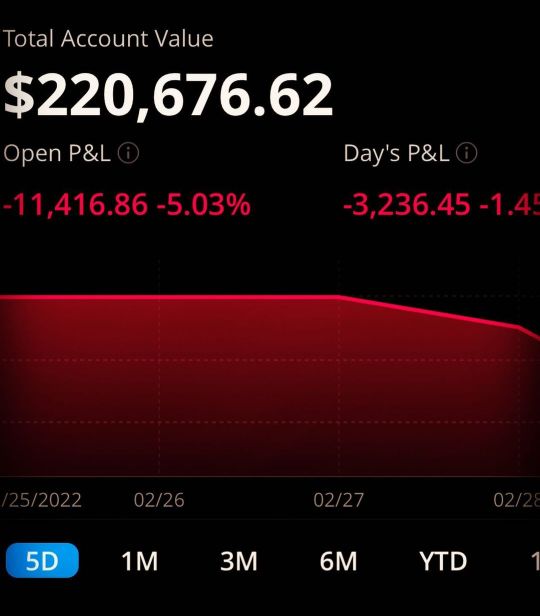#GrowthInvestment
Text
Crypto Mining makes Happy :-)
Crypto mining makes us happy because it’s an unconventional and awesome way to earn passive income.
At http://www.cryptominersale.com you dive into the world of crypto mining and make great monthly profits.
Let’s be happy together and unleash your potential as a crypto miner!
#CryptoMining #Cryptocurrency #Blockchain #BitcoinMining#EarnMore #Mining #Miners #BTCHashRate #CloudMining#Profitable…

View On WordPress
#BitcoinEquipment#bitcoinmining#Blockchain#btchashrate#CloudMining#Cryptocur#cryptocurrency#CryptocurrencyInvesting#cryptomining#CryptoMiningFarming#GentleMoney#GrowthInvestment#miners#Mining#MiningTools#NewMining#PassiveIncome
0 notes
Text


Blue Chip Stocks: These are shares of well-established, financially stable, and reputable companies with a history of consistent performance. Blue chip stocks are generally considered safe and reliable investments.
Dividend Stocks: Companies that distribute a portion of their earnings to shareholders in the form of dividends. These stocks are often favored by investors seeking regular income.
Defensive Stocks: Companies that tend to remain stable even during economic downturns. They are less sensitive to economic cycles, and their products or services are considered essential.
Growth Stocks: These are shares of companies expected to grow at an above-average rate compared to other companies. Investors in growth stocks are typically focused on capital appreciation rather than dividends.
Cyclical Stocks: Companies whose performance is closely tied to the economic cycle. These stocks often do well when the economy is booming but may suffer during economic downturns.
Penny Stocks: Stocks with a low market price, usually trading at less than $5 per share. Penny stocks are often associated with smaller, riskier companies and can be more volatile than stocks of larger, more established companies
Call us at : +91 8411002452 OR Visit: www.goldenbulls.co.in
#BlueChipStocks#DividendInvesting#DefensiveStocks#GrowthInvesting#CyclicalStocks#PennyStocks#InvestmentStrategies#DiversifyYourPortfolio#StockTips#MarketTrends#EconomicCycles#RiskManagement#Financialservices#FinancialWellness#Goldenbulls
0 notes
Text
Video: NVIDIA and its Price-to-Earnings ratio
We look at #NVIDIA and its #pricetoearnings or #PE ratios, and #growthinvesting.
The #CanadianMoneyTalk channel concentrates on #Canadianinvesting and #personalfinance in Canada.
Visit: http://www.canadianmoneytalk.caThe Advanced Investing: Stock Analysis Course is at http://canadianmoneytalk.ca/advanced-investing-stock-analysis-course/My Investing & Personal Finance Basics course is at…

View On WordPress
0 notes
Link
#dividendyield#earningsgrowthrate#growthinvesting#investingstrategies#long-terminvesting#marginofsafety#P/Bratio#P/Eratio#Stockmarket#Valueinvesting
0 notes
Text

Momentum Trading:
1. Pros: Ride the trend for short-term profits; quantitative tools for analysis.
2. Cons: High volatility; overcrowded trades; market timing risks.
#ValueInvesting #GrowthInvesting #DividendInvesting #MomentumTrading #InvestmentProsCons #RiskVsReward #MarketStrategies #InvestmentDiversity #FinancialPlanning #WealthManagement
0 notes
Text
The Ultimate List of Budget Categories

Are you tired of feeling like your finances are spiralling out of control? Worried about overspending and unsure where your money goes each month? Look no further!
In this article, we present the ultimate list of budget categories that will help you take control of your financial life.
From essentials like housing and groceries to leisure activities and unexpected expenses, we've got you covered. Let's dive into the world of budgeting and discover how you can achieve your financial goals.
The Ultimate List of BUDGET CATEGORIES
Creating a budget that covers all aspects of your life is the first step towards achieving financial stability. By allocating your income into specific categories, you can track your spending, save more, and make informed financial decisions. Below, we've outlined the ultimate list of budget categories to consider incorporating into your budgeting strategy.
CategoryDescriptionHousingCovers expenses related to your primary residence, including rent or mortgage payments, property taxes, home insurance, utilities, and maintenance costs.TransportationIncludes costs associated with getting around, such as fuel, public transportation fares, car insurance, maintenance, and parking fees.GroceriesBudget for your weekly or monthly grocery shopping, including food, beverages, household supplies, and personal care items.UtilitiesAllocate funds for essential services like electricity, water, heating, and internet or phone bills.Debt PaymentsIf you have outstanding loans or credit card debt, allocate a portion of your budget to make regular payments and reduce your debt over time.SavingsPrioritize saving by setting aside a portion of your income for emergency funds, retirement accounts, and other future goals.InsuranceCover various types of insurance, including health, life, auto, and home insurance premiums.EntertainmentPlan for leisure activities, such as dining out, movies, hobbies, and vacations.Personal CareBudget for personal grooming and self-care expenses, such as haircuts, skincare products, and wellness treatments.EducationAllocate funds for ongoing learning, whether it's taking courses, attending workshops, or purchasing educational materials.HealthcareAccount for medical expenses, including doctor visits, prescriptions, health insurance premiums, and medical supplies.ClothingSet aside money for clothing and accessories, considering both everyday wear and special occasions.Charitable GivingInclude a category for donations to charitable organizations or causes that you support.Home MaintenanceBudget for unexpected repairs and upkeep for your home, such as fixing appliances, renovating, or replacing essential items.Personal GrowthInvest in personal development activities, such as coaching, self-help books, and attending seminars or conferences.GiftsAccount for gifts for family, friends, and special occasions throughout the year.ChildcareIf you have children, allocate funds for childcare services, school-related expenses, and extracurricular activities.Pet CareBudget for expenses related to your pets, including food, veterinary care, grooming, and supplies.ElectronicsPlan for technology-related purchases, such as smartphones, laptops, and other electronic devices.TravelSet aside funds for travel expenses, whether it's for business trips or leisure vacations.Home OfficeIf you work from home, consider expenses related to your home office setup, including furniture, equipment, and supplies.MiscellaneousCreate a catch-all category for unexpected or irregular expenses that don't fit into other predefined categories.Leisure ActivitiesBudget for hobbies, recreational activities, and memberships to clubs or fitness centers.Dining OutSet a specific budget for eating out at restaurants or ordering takeout.Emergency FundAllocate funds to build and maintain an emergency fund to cover unexpected financial setbacks.
Housing: Finding Financial Stability in Your Shelter
Finding the right balance between a comfortable living space and financial stability is crucial. Housing is often the largest expense in a budget, encompassing various costs that can impact your overall financial health.
Whether you're renting an apartment or paying off a mortgage, consider these tips to manage your housing expenses effectively:
- Rent vs. Buy: Before making a decision, evaluate whether renting or buying a home is more financially viable for you. Calculate the costs involved in each option, including mortgage payments, property taxes, and maintenance.
- Roommates: If you're comfortable with it, having a roommate can significantly reduce housing costs, making it easier to allocate funds to other categories.
- Utilities: Be mindful of your energy consumption to reduce utility bills. Consider energy-efficient appliances and practices to lower costs.
- Maintenance: Regular maintenance can prevent costly repairs in the long run. Set aside a portion of your budget for home maintenance and repairs.
- Downsizing: If your current housing situation is stretching your budget, consider downsizing to a smaller space that better suits your financial capabilities.
Transportation: Navigating Your Budget on the Go
Transportation expenses can add up quickly, affecting your overall financial picture. Whether you rely on public transit or own a car, managing transportation costs is essential for maintaining a balanced budget.
Here are some strategies to help you stay on top of your transportation expenses:
- Public Transit: If available, consider using public transportation to save on fuel and parking costs. Monthly passes or discounted fares can provide significant savings.
- Carpooling: Share rides with friends, coworkers, or neighbours to split the costs of commuting.
- Fuel Efficiency: If you own a car, choose a fuel-efficient model and practice fuel-saving habits, such as avoiding unnecessary idling and maintaining proper tire pressure.
- Maintenance: Regular vehicle maintenance can prevent breakdowns and costly repairs. Schedule routine check-ups to catch any issues early on.
- Biking/Walking: For short distances, consider biking or walking to save on transportation costs and promote a healthier lifestyle.
Groceries: Feeding Your Body and Budget
Grocery shopping is a routine expense that can significantly impact your budget over time. By adopting smart shopping habits and meal planning strategies, you can save money while still enjoying delicious and nutritious meals.
Here are some tips to make the most of your grocery budget:
- Meal Planning: Plan your meals for the week ahead and create a shopping list based on your planned recipes. This prevents impulsive purchases and reduces food waste.
- Coupons and Sales: Take advantage of coupons, discounts, and sales to save money on your grocery purchases. Be cautious, however, not to buy items solely because they're on sale.
- 3. Bulk Buying: Consider buying non-perishable items in bulk to take advantage of lower unit prices. Just be sure to only purchase items you'll use before they expire.
- Store Brands: Opt for store-brand products instead of name-brand items. Often, the quality is comparable, but the price is lower.
- Avoid Convenience Foods: Pre-packaged convenience foods tend to be more expensive. Opt for whole ingredients and prepare meals from scratch to save money.
Debt Payments: Conquering Debt and Regaining Control
Debt can weigh heavily on your financial well-being, making it challenging to achieve your goals. By prioritizing debt payments and adopting a strategic approach, you can gradually reduce your debt and improve your financial situation.
Consider these strategies to tackle your debt effectively:
- Create a Repayment Plan: List all your debts, including credit cards, loans, and outstanding bills. Prioritize them based on interest rates and start paying off high-interest debts first.
- Snowball Method: Pay off your smallest debts first and then use the money you would have paid toward them to tackle larger debts. This approach builds momentum as you see quick wins.
- Negotiate Interest Rates: Contact your creditors to negotiate lower interest rates, especially if you have a good payment history. Lower rates can significantly reduce the amount of interest you pay over time.
- Consolidation: Consider consolidating your debts into a single loan or credit card with a lower interest rate. This can make managing payments more straightforward.
- Avoid New Debt: While paying off existing debt, avoid accumulating new debt. Use cash or your debit card instead of credit cards to control spending.
Savings: Securing Your Financial Future
Building a robust savings plan is essential for achieving your short-term and long-term financial goals. By consistently setting aside money and making wise investment decisions, you can create a strong financial foundation for yourself.
Here are some steps to kickstart your savings journey:
- Emergency Fund: Start by building an emergency fund that covers three to six months' worth of living expenses. This fund provides a safety net in case of unexpected financial challenges.
- Automate Savings: Set up automatic transfers from your checking account to a dedicated savings account. Treating savings as a non-negotiable expense ensures consistent contributions.
- Retirement Accounts: Contribute to retirement accounts like a 401(k) or IRA. These accounts offer tax advantages and can help you grow your wealth over time.
- Invest Wisely: Research different investment options and consider diversifying your portfolio to mitigate risk. Consult with a financial advisor if needed.
- Short-Term Goals: Allocate savings for short-term goals like a vacation, buying a car, or making a down payment on a home. Having specific targets keeps you motivated to save.
FAQs (Frequently Asked Questions)
Q: How do I decide on a budget for each category?A: Start by tracking your current spending for a few months to identify patterns. Then, allocate funds to each category based on your priorities and financial goals.
Q: What if my income varies from month to month?A: If you have irregular income, consider using a zero-based budgeting approach. Assign every dollar a specific purpose, including saving and covering irregular expenses.
Q: Should I budget for entertainment and leisure activities?A: Absolutely! Budgeting for leisure activities is essential to maintain a healthy work-life balance and prevent burnout.
Q: Is it okay to adjust my budget as circumstances change?A: Yes, flexibility is key to successful budgeting. Life is unpredictable, so be prepared to adjust your budget when necessary.
Q: How can I stick to my budget and avoid overspending?A: Regularly review your budget, track your expenses, and use tools like budgeting apps to stay on track. Avoid impulse purchases and focus on your financial goals.
Q: Is it possible to save money while paying off debt?A: Yes, it's possible. Create a balanced plan that allocates funds to both debt repayment and savings. Having an emergency fund can prevent new debt during unexpected situations.
Conclusion: Empower Your Financial Journey
Congratulations! You've now explored the ultimate list of budget categories that can transform your financial management approach.
By allocating your income strategically and making informed spending decisions, you'll be well on your way to achieving your financial goals.
Remember, budgeting is a continuous process that requires diligence and adaptability. Keep refining your budget as your circumstances evolve, and always prioritize your financial well-being.
Now that you're equipped with valuable insights on budgeting, you can confidently take control of your finances and work towards a more secure and fulfilling future.
Read the full article
0 notes
Text
Enroll in Our Courses Now!
Welcome to Organa's School - Where Learning is Fun and Effective! Discover Our Courses Today!
Empower Your Future
Unlock Your Potential: Practical Skills, Flexible Learning, and Long-Term Growth with Organa's Courses
Valuable Career SkillsOur courses provide practical skills and knowledge that are highly valued in today's job market, giving you a competitive edge in your career.
Flexible Online LearningWith flexible online learning options and a supportive community of instructors and peers, you can fit your studies into your busy schedule and achieve your goals.
Education for GrowthInvesting in your education can lead to long-term personal and professional growth, opening up new opportunities and improving your overall quality of life.
#digitalmarketing#onlineclasses#entrepreneur#jobs#programming#english#academy#institute#les#marketing#classes#uk#beauty#studyabroad#school#kursus#lesson#hobbies#javascript#covid#drumcoursebali#denpasar#drumcourse#balirudiment#kursusdrumbali#drummer#instagram#certification#growth#professional
0 notes
Text
Buy 6 December 2022 Be-All/End-All Dividend Stocks
Buy 6 December 2022 Be-All/End-All Dividend Stocks
damedeeso/iStock via Getty Images
Foreword
This article is based on seven Kiplinger/DogsOfThe Dow/GrowthInvesting articles aimed at revealing ‘the best’ for the rest of 2022:
15 Best Stocks to Buy for the Rest of 2022
The lesson of the past two years: Be ready for anything. Our 15 best stocks to buy for the rest of 2022 reflect several possible outcomes for the final quarter of this tumultuous…

View On WordPress
0 notes
Video
Robinhood Weekly Top 10 Adds
$NIO jumps into the top 10 this week. Investors are hoping that every EV company is the next Tesla.
But for this investment it’s better to bet on the jockey, not the horse.
There will be a bunch of #EV companies to come, as there were a bunch of combustion engine car companies that followed Ford.
To make a great investment in the space, bet on the Jockey. #Musk, #Bezos, #Gates, #Jobs, even #Zuckerberg are at the top of the food chain when it comes to CEOs and leadership. Bet on that type of CEO, not just the next EV company.
To learn more about investing, traditional investments and alternative investments stay connected with The Seville Report: eepurl.com/dBYI8T
#Robinhood#RobinhoodTop10#Stocks#Investing#Money#Investments#WallStreet#WallStreetMoney#ValueInvesting#GrowthInvesting#FinancialEducation#FinancialFreedom#StockMarket#InvestmentEducation#FinancialEducatoin#Research#Electric Vehicles#Tesla#Nio
1 note
·
View note
Photo

Another red week but less terrible then previous one at least in the market that is. ⠀ Haven’t really done anything in the markets. ⠀ I have family member who are currently in Ukraine 🇺🇦 so dealing with stock market and also worrying about what’s going in there is a bit tough (giving all other day to day responsibilities) but I’m hopeful that things will get better although at this moment in time who knows. ⠀ I will be doing a monthly post on my substack at some point this week hopefully so if you are interested check it out at www.from100kto1m.com or follow me on twitter and commonstock where you can see my portfolio in almost real time. ⠀ Pray for Ukraine 🇺🇦 🙏 ⠀ Til next time ✌️ ⠀ #investing #stockmarket #stocks #investor #money #100k #from100kto1m #value #valueinvesting #growth #growthinvesting #longterm #mindset #millionaire #millionairemindset #red #twitter #ukraine #war #peace #monthly #post #instagram #commonstock #followme #btfd #buying #selling #usa #options (at New York City, N.Y.) https://www.instagram.com/p/CalQI3xg1_3/?utm_medium=tumblr
#investing#stockmarket#stocks#investor#money#100k#from100kto1m#value#valueinvesting#growth#growthinvesting#longterm#mindset#millionaire#millionairemindset#red#twitter#ukraine#war#peace#monthly#post#instagram#commonstock#followme#btfd#buying#selling#usa#options
0 notes
Text
Crypto Mining makes Happy :-)
Crypto Mining macht uns glücklich, weil es eine unkonventionelle und tolle Möglichkeit ist, passives Einkommen zu erzielen.
Auf http://www.cryptominersale.com tauchst du in die Welt des Crypto Mining ein und erzielst tolle monatliche Gewinne.
Lass uns gemeinsam glücklich werden und dein Potenzial als Crypto-Miner entfalten!
#CryptoMining #Cryptocurrency #Blockchain #BitcoinMining#EarnMore #Mining…

View On WordPress
#BitcoinEquipment#bitcoinmining#Blockchain#btchashrate#CloudMining#cryptocurrency#CryptocurrencyInvesting#CryptocurrencyTrends#cryptomining#CryptoMiningFarming#GentleMoney#GrowthInvestment#miners#Mining#MiningTools#NewMining#PassiveIncome
0 notes
Photo

Surround yourself with people who force you to Level Up. 💕✈ https://t.me/SandhuValueInvesting #SandhuValueInvesting #growthinvesting #grow #levelup #surroundyourselfwithgoodpeople #growthmindset #wealthy #wealthyminds #wealth #richlife www.Sandhuvalueinvesting.blogspot.com https://www.instagram.com/p/CXxxs9ivHa0/?utm_medium=tumblr
#sandhuvalueinvesting#growthinvesting#grow#levelup#surroundyourselfwithgoodpeople#growthmindset#wealthy#wealthyminds#wealth#richlife
1 note
·
View note
Photo

Grab your free automated stock watchlist template with Google Sheets today! In the template, I provide a few examples, along with a blank page for you to create/import your own. This watchlist will automatically calculate P/E, P/S, P/B, sales and earnings growth, and momentum. With these calculations, a score will be concluded which can be used to rank the stocks in the watchlist. This watchlist is intended for educational purposes only and is not meant as financial advise. Use at your own discretion. 📈 📈 📈 #investing #stocks #stockmarket #watchlist #free #freetemplate #freewatchlist #valueinvesting #growthinvesting #momentuminvesting #warrenbuffet https://www.instagram.com/p/CNNbFNYDvtc/?igshid=y8df1s3y309g
#investing#stocks#stockmarket#watchlist#free#freetemplate#freewatchlist#valueinvesting#growthinvesting#momentuminvesting#warrenbuffet
0 notes
Text

Dividend Investing:
1. Pros: Stable income; historical outperformance; dividend growth potential.
2. Cons: Yield limitations; interest rate sensitivity; sector concentration.
#ValueInvesting#GrowthInvesting#DividendInvesting#MomentumTrading#InvestmentProsCons#RiskVsReward#MarketStrategies#InvestmentDiversity#FinancialPlanning#WealthManagement
0 notes
Text
The Ultimate List of Budget Categories

Are you tired of feeling like your finances are spiralling out of control? Worried about overspending and unsure where your money goes each month? Look no further!
In this article, we present the ultimate list of budget categories that will help you take control of your financial life.
From essentials like housing and groceries to leisure activities and unexpected expenses, we've got you covered. Let's dive into the world of budgeting and discover how you can achieve your financial goals.
The Ultimate List of BUDGET CATEGORIES
Creating a budget that covers all aspects of your life is the first step towards achieving financial stability. By allocating your income into specific categories, you can track your spending, save more, and make informed financial decisions. Below, we've outlined the ultimate list of budget categories to consider incorporating into your budgeting strategy.
CategoryDescriptionHousingCovers expenses related to your primary residence, including rent or mortgage payments, property taxes, home insurance, utilities, and maintenance costs.TransportationIncludes costs associated with getting around, such as fuel, public transportation fares, car insurance, maintenance, and parking fees.GroceriesBudget for your weekly or monthly grocery shopping, including food, beverages, household supplies, and personal care items.UtilitiesAllocate funds for essential services like electricity, water, heating, and internet or phone bills.Debt PaymentsIf you have outstanding loans or credit card debt, allocate a portion of your budget to make regular payments and reduce your debt over time.SavingsPrioritize saving by setting aside a portion of your income for emergency funds, retirement accounts, and other future goals.InsuranceCover various types of insurance, including health, life, auto, and home insurance premiums.EntertainmentPlan for leisure activities, such as dining out, movies, hobbies, and vacations.Personal CareBudget for personal grooming and self-care expenses, such as haircuts, skincare products, and wellness treatments.EducationAllocate funds for ongoing learning, whether it's taking courses, attending workshops, or purchasing educational materials.HealthcareAccount for medical expenses, including doctor visits, prescriptions, health insurance premiums, and medical supplies.ClothingSet aside money for clothing and accessories, considering both everyday wear and special occasions.Charitable GivingInclude a category for donations to charitable organizations or causes that you support.Home MaintenanceBudget for unexpected repairs and upkeep for your home, such as fixing appliances, renovating, or replacing essential items.Personal GrowthInvest in personal development activities, such as coaching, self-help books, and attending seminars or conferences.GiftsAccount for gifts for family, friends, and special occasions throughout the year.ChildcareIf you have children, allocate funds for childcare services, school-related expenses, and extracurricular activities.Pet CareBudget for expenses related to your pets, including food, veterinary care, grooming, and supplies.ElectronicsPlan for technology-related purchases, such as smartphones, laptops, and other electronic devices.TravelSet aside funds for travel expenses, whether it's for business trips or leisure vacations.Home OfficeIf you work from home, consider expenses related to your home office setup, including furniture, equipment, and supplies.MiscellaneousCreate a catch-all category for unexpected or irregular expenses that don't fit into other predefined categories.Leisure ActivitiesBudget for hobbies, recreational activities, and memberships to clubs or fitness centers.Dining OutSet a specific budget for eating out at restaurants or ordering takeout.Emergency FundAllocate funds to build and maintain an emergency fund to cover unexpected financial setbacks.
Housing: Finding Financial Stability in Your Shelter
Finding the right balance between a comfortable living space and financial stability is crucial. Housing is often the largest expense in a budget, encompassing various costs that can impact your overall financial health.
Whether you're renting an apartment or paying off a mortgage, consider these tips to manage your housing expenses effectively:
- Rent vs. Buy: Before making a decision, evaluate whether renting or buying a home is more financially viable for you. Calculate the costs involved in each option, including mortgage payments, property taxes, and maintenance.
- Roommates: If you're comfortable with it, having a roommate can significantly reduce housing costs, making it easier to allocate funds to other categories.
- Utilities: Be mindful of your energy consumption to reduce utility bills. Consider energy-efficient appliances and practices to lower costs.
- Maintenance: Regular maintenance can prevent costly repairs in the long run. Set aside a portion of your budget for home maintenance and repairs.
- Downsizing: If your current housing situation is stretching your budget, consider downsizing to a smaller space that better suits your financial capabilities.
Transportation: Navigating Your Budget on the Go
Transportation expenses can add up quickly, affecting your overall financial picture. Whether you rely on public transit or own a car, managing transportation costs is essential for maintaining a balanced budget.
Here are some strategies to help you stay on top of your transportation expenses:
- Public Transit: If available, consider using public transportation to save on fuel and parking costs. Monthly passes or discounted fares can provide significant savings.
- Carpooling: Share rides with friends, coworkers, or neighbours to split the costs of commuting.
- Fuel Efficiency: If you own a car, choose a fuel-efficient model and practice fuel-saving habits, such as avoiding unnecessary idling and maintaining proper tire pressure.
- Maintenance: Regular vehicle maintenance can prevent breakdowns and costly repairs. Schedule routine check-ups to catch any issues early on.
- Biking/Walking: For short distances, consider biking or walking to save on transportation costs and promote a healthier lifestyle.
Groceries: Feeding Your Body and Budget
Grocery shopping is a routine expense that can significantly impact your budget over time. By adopting smart shopping habits and meal planning strategies, you can save money while still enjoying delicious and nutritious meals.
Here are some tips to make the most of your grocery budget:
- Meal Planning: Plan your meals for the week ahead and create a shopping list based on your planned recipes. This prevents impulsive purchases and reduces food waste.
- Coupons and Sales: Take advantage of coupons, discounts, and sales to save money on your grocery purchases. Be cautious, however, not to buy items solely because they're on sale.
- 3. Bulk Buying: Consider buying non-perishable items in bulk to take advantage of lower unit prices. Just be sure to only purchase items you'll use before they expire.
- Store Brands: Opt for store-brand products instead of name-brand items. Often, the quality is comparable, but the price is lower.
- Avoid Convenience Foods: Pre-packaged convenience foods tend to be more expensive. Opt for whole ingredients and prepare meals from scratch to save money.
Debt Payments: Conquering Debt and Regaining Control
Debt can weigh heavily on your financial well-being, making it challenging to achieve your goals. By prioritizing debt payments and adopting a strategic approach, you can gradually reduce your debt and improve your financial situation.
Consider these strategies to tackle your debt effectively:
- Create a Repayment Plan: List all your debts, including credit cards, loans, and outstanding bills. Prioritize them based on interest rates and start paying off high-interest debts first.
- Snowball Method: Pay off your smallest debts first and then use the money you would have paid toward them to tackle larger debts. This approach builds momentum as you see quick wins.
- Negotiate Interest Rates: Contact your creditors to negotiate lower interest rates, especially if you have a good payment history. Lower rates can significantly reduce the amount of interest you pay over time.
- Consolidation: Consider consolidating your debts into a single loan or credit card with a lower interest rate. This can make managing payments more straightforward.
- Avoid New Debt: While paying off existing debt, avoid accumulating new debt. Use cash or your debit card instead of credit cards to control spending.
Savings: Securing Your Financial Future
Building a robust savings plan is essential for achieving your short-term and long-term financial goals. By consistently setting aside money and making wise investment decisions, you can create a strong financial foundation for yourself.
Here are some steps to kickstart your savings journey:
- Emergency Fund: Start by building an emergency fund that covers three to six months' worth of living expenses. This fund provides a safety net in case of unexpected financial challenges.
- Automate Savings: Set up automatic transfers from your checking account to a dedicated savings account. Treating savings as a non-negotiable expense ensures consistent contributions.
- Retirement Accounts: Contribute to retirement accounts like a 401(k) or IRA. These accounts offer tax advantages and can help you grow your wealth over time.
- Invest Wisely: Research different investment options and consider diversifying your portfolio to mitigate risk. Consult with a financial advisor if needed.
- Short-Term Goals: Allocate savings for short-term goals like a vacation, buying a car, or making a down payment on a home. Having specific targets keeps you motivated to save.
FAQs (Frequently Asked Questions)
Q: How do I decide on a budget for each category?A: Start by tracking your current spending for a few months to identify patterns. Then, allocate funds to each category based on your priorities and financial goals.
Q: What if my income varies from month to month?A: If you have irregular income, consider using a zero-based budgeting approach. Assign every dollar a specific purpose, including saving and covering irregular expenses.
Q: Should I budget for entertainment and leisure activities?A: Absolutely! Budgeting for leisure activities is essential to maintain a healthy work-life balance and prevent burnout.
Q: Is it okay to adjust my budget as circumstances change?A: Yes, flexibility is key to successful budgeting. Life is unpredictable, so be prepared to adjust your budget when necessary.
Q: How can I stick to my budget and avoid overspending?A: Regularly review your budget, track your expenses, and use tools like budgeting apps to stay on track. Avoid impulse purchases and focus on your financial goals.
Q: Is it possible to save money while paying off debt?A: Yes, it's possible. Create a balanced plan that allocates funds to both debt repayment and savings. Having an emergency fund can prevent new debt during unexpected situations.
Conclusion: Empower Your Financial Journey
Congratulations! You've now explored the ultimate list of budget categories that can transform your financial management approach.
By allocating your income strategically and making informed spending decisions, you'll be well on your way to achieving your financial goals.
Remember, budgeting is a continuous process that requires diligence and adaptability. Keep refining your budget as your circumstances evolve, and always prioritize your financial well-being.
Now that you're equipped with valuable insights on budgeting, you can confidently take control of your finances and work towards a more secure and fulfilling future.
Read the full article
0 notes
Link
There is no “the best investment strategy” with the exception of the one that works best for you...
1 note
·
View note